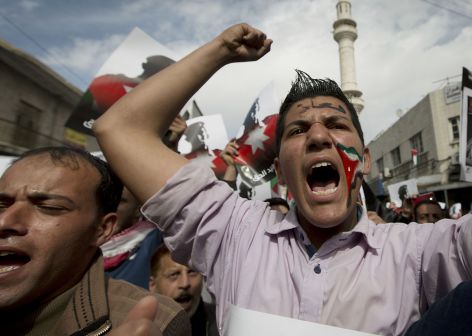Jordan: Unity Through Terror
A Life, Hope & Truth correspondent in Amman, Jordan, reports on Jordan’s response to the shocking murder of a Jordanian pilot at the hands of ISIS.
Demonstrators, one with a Jordanian flag image painted on his face and Arabic that reads, “Muath,” as in slain Jordanian pilot, Lt. Muath al-Kasasbeh, chant anti-Islamic State group slogans during a rally in Amman, Jordan, Friday, Feb. 6, 2015. Several thousand people marched after Muslim Friday prayers in support of King Abdullah II’s pledge of a tough military response to the killing of the pilot. (AP Photo/Nasser Nasser)
Last summer there was not widespread support of Jordan’s involvement in the war against ISIS. But Jordanians have unified following the burning death of pilot Muath Al-Kasasbeh at the hands of ISIS. The situation has people in this country—Bedouins, Palestinians, Christians, Muslims, etc.—coming together and generally supporting the Jordanian government in its fight against ISIS.
There was a large rally to welcome King Abdullah home after he cut his visit to the U.S. short due to the pilot’s murder. A few days later there was another large rally attended by Queen Rania. Conversations, Facebook posts and news reports are patriotic as they mourn the death of the pilot.
Jordan has long been an oasis of peace and a haven for refugees from the warring countries surrounding it. This situation brought terror and violence very close to home for Jordanians.
Jordan’s rapid response
The day after the video of the burning was released, all government buildings were closed for the day, and Jordan hung two convicted terrorists who were on death row. One, Sajida Rishawi, had been at the center of an attempted hostage exchange between ISIS and Jordan prior to the release of the video. The king returned later that day from his visit to the U.S., and the following day Jordan began an air strike campaign against ISIS, dubbed “Operation Martyr Muath.”
The Jordanians responded more quickly than other Western countries would have in a similar situation. In Jordan, it is imperative for the government to act speedily in order to maintain the national unity and to prevent citizens from seeking revenge on their own.
This is not Islam
While violence is common in the Middle East, this act seemed to strike a particular chord in Jordan. The primary cause of the popular anger was the brutal burning of Kasasbeh, which is contrary to Muslim teachings forbidding the cremation of bodies and the fact that many Muslim Jordanians believe this behavior badly misrepresents Islam. Despite Western stereotypes, many Muslims are peace-loving, kind people and are upset with extremist groups like ISIS and Al-Qaeda, believing they are the biggest enemies of Islam.
In a televised message at the Government Summit held in Dubai on Feb. 9, Jordan’s Queen Rania said, “We are in a race against time to adopt policies that address the priorities which confront us today: most importantly, to eliminate the ideology of hate and terrorism, not just militarily, but ideologically as well.”
Illusions of safety
Jordan has long been an oasis of peace and a haven for refugees from the warring countries surrounding it. This situation brought terror and violence very close to home for Jordanians. This is also true for other nations who have had the illusion of safety and security shattered by events in recent years, such as last month’s attacks in Paris, France.
The situation also emphasizes the intricacies of international relationships, as well as the ancient divisions among peoples within the same country. The Jordanian government understands the powerful unifying effect this can have on the diverse Jordanian people. The problem is that uniting a diverse people against something like ISIS can have only a temporary effect.
Searching for peace
The Jordanian leadership continues to make efforts to promote tolerance in the region, but this is difficult considering the deep-seated hatred that makes the Middle East a dangerous place. Peace has to start with individual people and then expand to families, communities and nations. Lasting peace is unlikely to come to the region anytime soon.
This is why it is so important to regularly pray, “Your kingdom come.” Only the coming Kingdom of God will bring lasting peace to the Middle East and to the world. Until then, it is up to us to live as peaceably as possible with those around us, creating small havens of refuge as Jordan has tried to do in the Middle East.
For further insight into this topic, read “Peace in the Middle East.”
Date Posted: February 19, 2015

